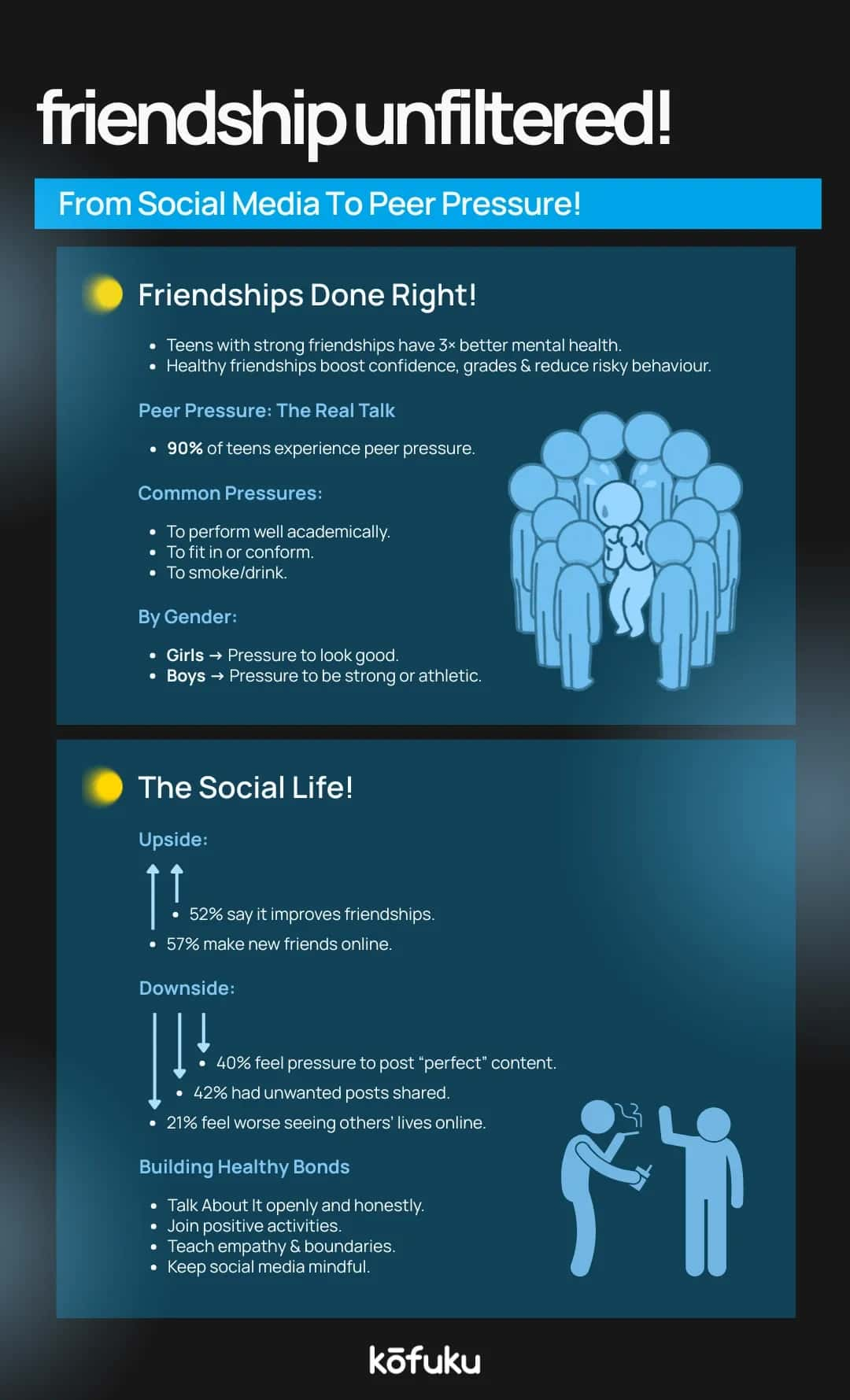Helping Teens Build Positive Social Connections and Confidence

Introduction
It is common to hear parents express concerns about their adolescent children’s screen time, smaller social circles, and communication hesitancy.
In today’s digital age, where friendships are often created and maintained online, and social approval is garnered through likes and follows, establishing genuine, in-person connection is more crucial than ever.
For adolescents undergoing profound emotional, social, and cognitive changes, these positive social and family relationships are the emotional touchstones key to building resilience, confidence, and a vital sense of belonging.
Why Teen Social Connections Matter
The connections teens form at this age strongly influence their self-construction, problem-solving, and decision-making. Adolescents with strong, caring friendships tend to achieve academically, experience lower anxiety, and have greater self-worth.
Adolescence is a critical time for developing relationships, as these connections foster empathy, respect, and conflict-resolution skills. If these friendships are developed positively, teens are likely to grow into emotionally mature adults and carry these values into their relationships.
How Building Teen Confidence Supports Social Skills
Confidence fuels social interactions. When a teenager feels confident, they are more likely to socialise, assert their personal boundaries, and engage in positive relationships without the fear of social judgment. Socially confident adolescents will initiate friendships and engage in healthy conflict resolution.
Specific types of recognition by adults, such as parents and teachers, will facilitate positive social development. When adults acknowledge their input, even in small tasks, and celebrate their outcomes, they tend to develop a positive self-image.
Social development is associated with feedback that guides growth, encourages club participation, and involves cooperative leadership roles.

Supporting Teen Relationships Effectively
For emotional development, teens need to establish healthy friendships and peer relationships. Supporting teen relationships involves letting young people examine their social circles with gentle guidance.
Overprotective or excessive intervention can break trust, while complete disengagement can leave them open to adverse influences.
Establishing safe spaces for dialogue is a fundamental way. Discussing the dynamics of friendships, boundaries, and respect will help them make rational decisions. Encouraging them to reflect on how certain friendships affect their feelings fosters emotional awareness.
Encouraging Teen Empathy Development
In a time when digital communications are quickly replacing emotional interactions, developing empathy is a priority. It enables teens to understand others' emotions, respond appropriately, and build relationships based on trust.
Parents can help develop empathy by encouraging the teens to understand different perspectives, through discussions, community service, or family narratives where compassion was pivotal.
Watching movies or reading narratives that examine emotional human interactions can lead to conversations centred on empathy and understanding.
Teaching Teen Responsibility Skills
Without social accountability, growth is stunted. The development of skill sets in responsibility fosters reliability, trust, and respect in interpersonal relationships.
The ability to manage time, keep commitments, and take ownership of decisions is integral to garnering respect, not only from peers but also from adults.
Teaching responsibility could range from including teens in decision-making and chores to experiential learning grounded in the consequences of their decisions.
Positive Teen Guidance Strategies for Parents
Rewarding positive guidance revolves around offering support, not control. Guiding teens works best in settings where their input counts, and they feel respected.
Strength-based supervision requests and active listening are even more profound when combined with the associated rationale, limited to the parental expressions of emotions. The exercise of control in self-restoration countdown periods contributes to self- and rule-respect.
Teens learn to use respectful communication, emotional regulation, and empathy when parents demonstrate these qualities in conversations.

Communication Tips for Parents and Teens
At the centre of each healthy relationship is effective communication. Open communication fosters trust and helps avoid unnecessary misunderstandings.
Parents can ensure active listening by maintaining focused attention, refraining from interruptions, and listening to their point of view without judgment.
Dealing with Social Challenges and Peer Pressure
A significant pressure adolescents face is peer pressure. Teens deal with the pressure of social trends, academic competition, and group expectations.
During these moments, positive guidance helps teens learn the difference between a healthy influence and harmful conformity.
Encouraging Extracurricular Activities to Build Connections
Participation in activities encourages socialisation of behaviour and emotions with peers. They develop a strong sense of confidence and belonging to a community.
Introverted teens can find creative activities, such as music or writing, to be their primary means of expression and a way to socialise.
Utilising Online Resources for Supporting Teens
Social media gets a lot of criticism, but when used correctly, it can help support teen relationships and assist learning. Teenagers can visit educational sites, attend online workshops, and participate in mental health forums to gain valuable information and meet others with similar interests.
Parents should direct their teens toward constructive uses of technology, such as following motivational accounts, joining educational groups, or acquiring new skills.

FAQs
Q. How can parents effectively support their teens' social connections?
A. Parents can support teen social connections by encouraging open communication, modelling healthy friendships, and providing safe opportunities for interaction. Listening without judgement and guiding them through challenges fosters trust and emotional security.
Q. What are the best ways to build teen confidence?
A. Building teen confidence involves recognising their efforts, offering genuine praise, setting achievable goals, and encouraging independent decision-making. Supportive environments that value self-expression and learning from mistakes nurture lasting self-esteem and resilience.
Q. How do teens develop empathy skills?
A. Teen empathy development occurs through active listening, perspective-taking, and discussing others’ feelings. Volunteering, group projects, and family discussions about emotions help teens understand diverse viewpoints and strengthen emotional intelligence.
Q. What positive guidance helps teenagers handle peer pressure?
A. Positive teen guidance includes teaching assertive communication, reinforcing personal values, and role-playing challenging situations. When teens feel heard and trusted, they make independent, confident decisions despite external influence.
Q. How important is responsibility in teen relationships?
A. Teen responsibility skills are vital for building trust, respect, and accountability. Encouraging responsibility teaches emotional maturity, helping teens manage conflicts, honour commitments, and maintain balanced, healthy friendships.
Q. What extracurricular activities help teens build friendships?
A. Extracurricular activities such as sports, theatre, music, volunteering, and student clubs provide shared goals and teamwork experiences. These environments promote collaboration, enhance communication, and help teens develop lasting friendships naturally.

Myths of Perfect Parenting – Don’t Fall for These Lies

Navigating Quarantine with Kids: A Parent's Survival Guide

How Illness Affects Children's Emotions: A Parental Guide

Navigating the Mental Health of New Parents

Parenting Advice: Why One-Size-Fits-All Doesn’t Work


